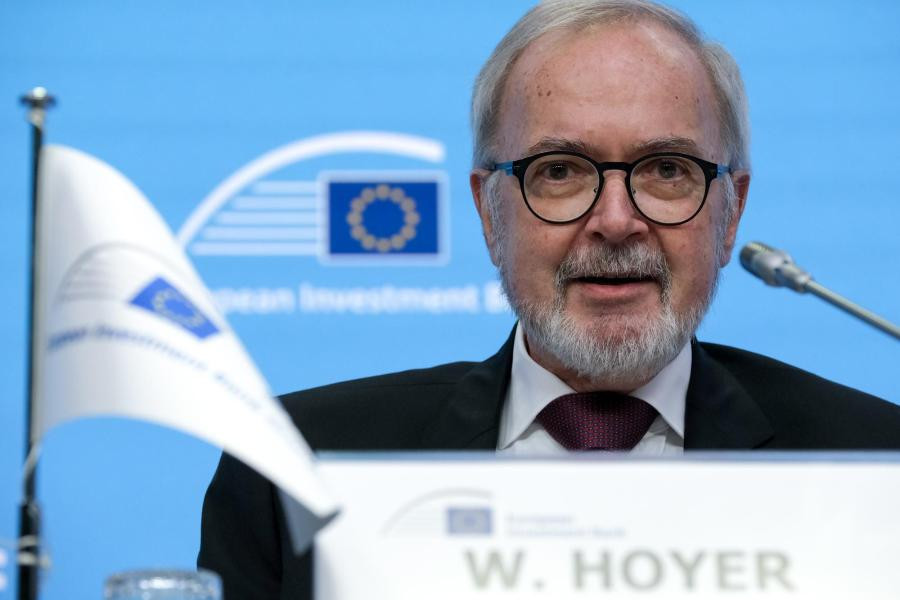EIB head Werner Hoyer on Thursday revealed the EIB’s new logo, which features the bank’s headquarters in Luxembourg, hoping to cement its position “as the EU bank”. The institution also underlined this position in its activity report for 2022.
The Russian attack on Ukraine demonstrated the need for a union-wide energy independence. The €17.06bn in new financing of renewables, efficiency, storage and grids the EIB signed during the year show “the EU bank’s unwavering commitment to ensure access to affordable energy at a time of extreme uncertainty,” a statement says, highlighting that this is “a record amount in new financing for renewables”.
Breaking it down, €6.71bn went into energy efficiency financing, of which €5.35bn went towards energy-efficient buildings. Renewable energy was attributed at €5.53bn, of which over €1.46bn were for onshore and offshore wind, and over €2.44bn for solar photovoltaic energy. Electricity grids and storage financing got €4.81bn.
Exceeding targets
In its report, the EIB also applauds itself for “delivering on our promises, we exceeded our targets, we put our money where our mouth is”, signing a total of €72.5bn in financing, which should support around €260bn in investment and create 950,000 jobs by 2026, the bank said. It also expects this to add 1.07% to EU GDP by then. Total EIB borrowing lay at €44.28bn.
It is imperative that Europe keeps up and stays the course, both for the sake of our planet and for safeguarding the competitiveness of our economies.
In support of Ukraine, the EIB disbursed €1.7bn in funds to help the country finance emergency infrastructural repairs, while EIB Global--a branch set up at the start of 2022 to support people and companies worldwide--signed €9.1bn in new financing.
On the side of green financing too, the EIB is satisfied with its results. “At a time when the United States is rolling out the biggest green subsidy programme in history, it is imperative that Europe keeps up and stays the course, both for the sake of our planet and for safeguarding the competitiveness of our economies,” EIB president Werner Hoyer stated. Indeed, 58% of the bank’s financing went towards climate action and environmental sustainability, going above the 50% target and keeping it on track to reach the €1trn in green financing the bank wants to reach by 2030.
More than €9bn to SME and climate and infrastructure projects from EIF
The European Investment Fund in 2022 committed over €9bn to small businesses, which is expected to mobilise around €97bn in investments towards climate neutrality, the digitalisation of industries in the EU and the competitiveness of EU businesses. 27% went to smaller businesses in the innovation and digitalisation fields while a third went towards sustainability and the switch to renewables.
Acknowledging the uncertainty and instability 2023 presents, the EIF “plans to press ahead with the deployment of the multi-thematic InvestEU programme and supplement it with new plans” and to “continue to support European small businesses while also growing our activity in sustainability-oriented finance solutions such as climate and infrastructure funds”.
The EIB also shared some of the outcomes it expected its financing to have. Among these are the support of 430,000 SME’s, 5.3m jobs sustained in SMEs, energy provision of 8.5m households, access to safer drinking water for 25.4m people, a reduction in flooding risks for 234,700 people and an additional 570.1m passenger trips on EIB-financed public transport.

